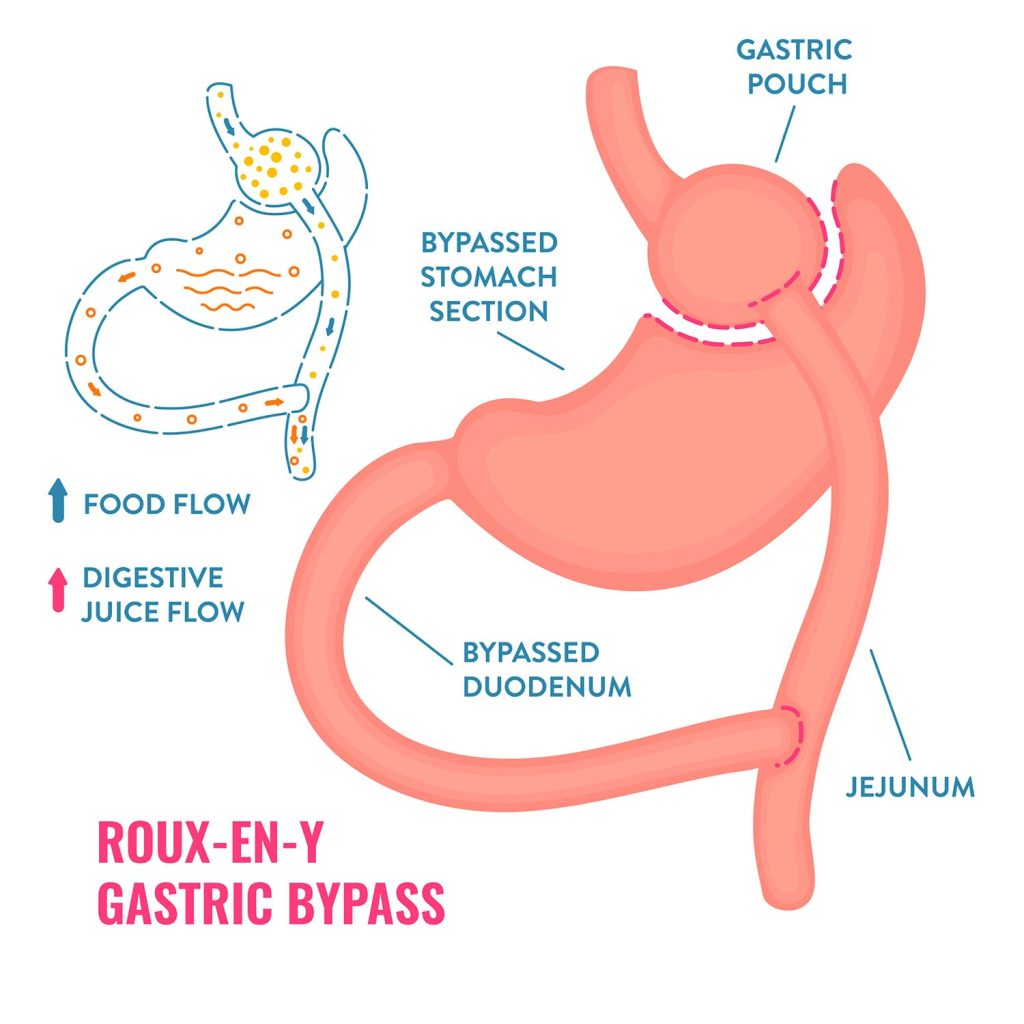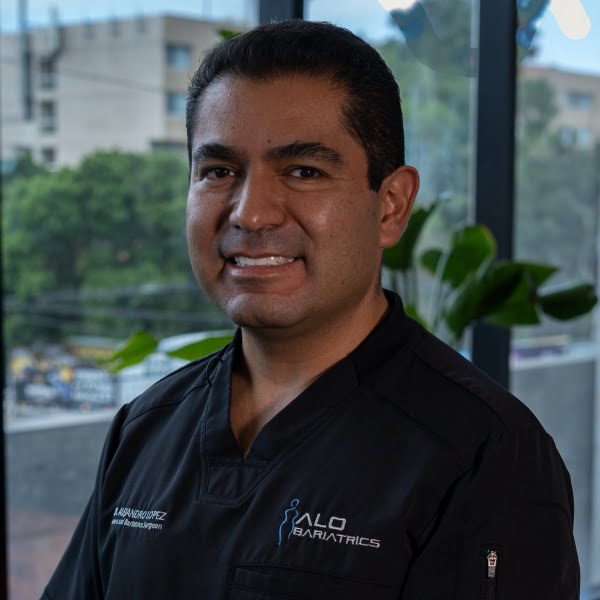Duodenal Switch vs Gastric Bypass: What’s the Difference and Which One is Best for You?
Summary: Duodenal Switch vs. Gastric Bypass
There are some key differences between duodenal switch vs gastric bypass surgery that your bariatric surgeon will consider when choosing the right procedure for you. Both surgeries help with weight loss by reducing the size of your stomach and bypassing part of your small intestine. However, the duodenal switch focuses more on malabsorption, while the gastric bypass focuses more on restriction.
The duodenal switch is typically recommended for individuals over 50 with a higher BMI (body mass index), whereas gastric bypass is more commonly performed for those in the mid-40s to 50. While gastric bypass is generally considered less complicated, a duodenal switch may result in greater weight loss.
What is Gastric Bypass Surgery?

Gastric bypass surgery, also known as Roux-en-Y, has been a popular choice for bariatric surgery for more than six decades. The surgeon reduces the size of the patient’s stomach and changes the intestinal anatomy to alter the food’s path. By shrinking the stomach, patients can feel full from smaller meals, leading to a decrease in hunger signaling hormones to the brain. Additionally, a significant portion of the small intestine’s absorptive function is bypassed, resulting in reduced calorie absorption by the body.
This procedure has been shown to be effective and is commonly utilized by bariatric surgeons worldwide in the treatment of obesity and related health conditions.
What is Duodenal Switch Surgery?


The duodenal switch combines stomach restriction with the bypassing of the digestive process, leading to metabolic and hormonal changes that result in substantial weight loss and improved type 2 diabetes.
The biliopancreatic diversion with duodenal switch (BPD-DS), commonly known as the duodenal switch, has been performed for nearly 40 years. However, due to its complexity, this surgery is less common and is only reserved for the most skilled surgeons. It is typically recommended for individuals with a higher BMI and significant weight loss goals.
Following a gastric sleeve procedure, where a portion of the stomach is removed to reduce its size, patients also undergo a change in their small intestine. The duodenal switch preserves the normal function of the stomach. During this surgery, two sections of the small intestine are rerouted to bypass a large section of the digestive tract, limiting calorie absorption from food.
Comparing Duodenal Switch and Gastric Bypass
Gastric bypass and duodenal switch surgeries are both successful in helping patients shed significant amounts of weight. They also cause hormonal and metabolic changes that decrease appetite, delay digestion, and improve or eliminate weight-related health issues. Gastric bypass has the largest impact on hunger hormones, leaving patients feeling fuller for longer periods. Sometimes, patients need to be reminded to eat because they don’t feel hungry.
When we compare the two procedures, we can see that gastric bypass is more suitable for patients with a BMI of 40-50. It is a less complex surgery, which means shorter surgical times and reduced risk of complications. On the other hand, gastric bypass produces less total weight loss compared to the duodenal switch.
The duodenal switch is less common than other bariatric surgeries because it is more complicated and used in extreme cases. Only a few of the very best surgeons are able to complete the duodenal switch due to the complexity of the procedure.
Differences in Procedures
During gastric bypass, the stomach is reduced by up to 80%, creating a pouch that can hold about one ounce of food, similar in size to a golf ball. Alternatively, a duodenal switch surgery creates a slightly larger pouch by reducing the stomach size by approximately 60%, allowing it to hold around 2 to 5 oz of food.
Additionally, duodenal switch surgery bypasses a larger portion, about 75%, of the small intestine, while gastric bypass surgery bypasses a smaller percentage, ranging from 30% to 60%.
Both surgeries can lead to substantial weight loss in patients who choose to fully engage in living a healthier life after surgery and are serious about their commitment to weight loss. Speak with a surgeon from ALO Bariatrics today to see which surgery may align best with your goals.
Analysis of Weight Loss Expectations
When it comes to comparing the potential for excess weight loss between the duodenal switch and gastric bypass, the duodenal switch proves to be more effective in helping patients achieve a greater percentage of their excess weight.
Surgeons usually recommend duodenal switch surgery for patients with higher BMI, as it leads to weight loss of 75-80% of their excess body weight. Patients who choose gastric bypass typically experience a slightly lower average weight loss.
Difference Nutritional Implications
Both duodenal switch and gastric bypass surgeries can lead to complications related to malnutrition because they alter the body’s ability to absorb nutrients. Patients who have undergone these surgeries need to supplement their diet with various vitamins and minerals, such as a complete multivitamin, iron, Vitamin C, calcium, Vitamin D, and Vitamin B12. They must follow a specific dietary plan to ensure proper nutrition intake.
The duodenal switch carries a higher risk of nutritional deficiencies as food moves faster through your digestive system, preventing absorption. Due to the significant decrease in nutrient absorption, patients who have had this surgery require a wider range of supplements on a more frequent basis compared to those who have had gastric bypass surgery.
With ALO Bariatrics, you’ll get personalized support and a dietary plan to meet your nutritional needs.
Recovery and Long-Term Care Comparison
Recovery and care after a Duodenal switch vs gastric bypass surgery are quite similar. Both procedures usually involve a two-day hospital stay and two to four weeks of recovery time. Patients can typically return to work after two weeks but should avoid strenuous activities for up to six weeks after surgery.
Instead of high-impact exercises like running, patients are advised to take daily walks to boost circulation and aid in the healing process. However, duodenal switch surgery being more complex may require extra time and attention for recovery and not to undo the progress that you’ve made. Both surgeries call for nutritional supplements and dietary adjustments, but the duodenal switch may require more ongoing monitoring and care.
Skilled surgeons using minimally invasive techniques can help decrease the time it takes to recover from either surgery. ALO Bariatrics has completed thousands of successful surgeries for patients choosing to be healthier through bariatric surgery.
Making the Right Choice for Your Needs
If you have been struggling to lose weight despite following a healthy diet and regular exercise, bariatric surgery might be the solution you’ve been looking for. At ALO Bariatrics, our experienced bariatric surgeons will carefully assess your medical history during your consultation to determine whether a duodenal switch surgery or gastric bypass is the most suitable option for you.
Our main goal is to provide exceptional post-surgical results, including significant weight loss, minimal complications, and a smooth transition into a healthier lifestyle. With our expertise, we aim to ensure long-lasting health benefits for you.
Bariatric Surgery with ALO Bariatrics
Discover the exceptional care and expertise at ALO Bariatrics, where our team of board-certified surgeons led by Dr. Alejandro Lopez is dedicated to helping you achieve your weight loss goals. With years of advanced bariatric surgery training at prestigious medical centers, including Cook County Hospital in Chicago and National Western Medical Center in Guadalajara, Dr. Lopez is also certified by the Mexican College of Surgery and Metabolic Diseases, one of few to achieve this distinction.
With state-of-the-art facilities in Tijuana, Guadalajara, and Puerto Vallarta, we offer the latest minimally invasive techniques for a quick recovery. Our commitment to safety and quality is reflected in our accreditations and affiliations with professional surgical organizations.
Choose ALO Bariatrics for a world-class medical tourism experience, complete with luxury accommodations, stress-free travel, bundled pricing, and personalized care. We’ll even organize a personal chauffeur for your entire stay in Mexico.
Contact us today to schedule a consultation and start your journey towards a healthier you.


Dr. Alejandro Lopez, the owner and lead bariatric surgeon at ALO Bariatrics, is a Fellow at the American College of Surgeons and is accredited with the American Society for Metabolic and Bariatric Surgery. He is also a certified bariatric surgeon by the Mexican College of Surgery for Obesity and Metabolic Diseases. He is one of two surgeons in Tijuana and one out of five to ten in all of Mexico who is able to provide robotic surgery.


